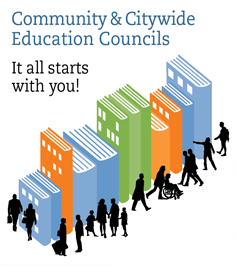Community Education Councils (CEC)
What is a Community Education Council?
Community Education Councils (CECs) are education policy advisory bodies responsible for reviewing and evaluating schools’ instructional programs, approving zoning lines, and advising the Chancellor. CECs play an essential role in shaping education policies for the New York City public schools. Each CEC consists of nine selected parent volunteers who provide hands-on leadership and support for their community's public schools, two residents and/or local business leaders appointed by the borough president, and one non-voting high school senior who lives in the district. Council members hold meetings at least every month with the superintendent and public at-large to discuss the current state of the schools in the district.
How many CECs are there?
There are 32 CECs in New York City. Each CEC covers a Community School District representing current K-8 students in the district.
How many members serve on a CEC?
- Nine (9) parents of students in grades Kindergarten through Eighth grade who currently attend a school under the jurisdiction of the community school district in which the parents wish to serve on the CEC; one (1) of the nine parents must be the parent of a child currently receiving special education services and one (1) of the nine parents must be the parent of a child currently receiving ELL services.
- Two (2) residents and/or local business owners appointed by the borough president; and
- One (1) non-voting high school senior who lives in the district and is an elected leader at his or her school.
When is eligibility determined?
Eligibility is determined as of the date that the parent submits an application to run for a position on a CEC.
How and when can I apply to serve on CEC?
During the 2013 Selection Process, you can apply to serve on a CEC HERE (on or after February 13, 2013). The application process ends at 11:59 pm on March 27th. For those lacking access to a personal computer, the Division of Family and Community Engagement (FACE) will provide information regarding how individuals may access computers at FACE’s office, in local district offices and schools, and at public libraries.



